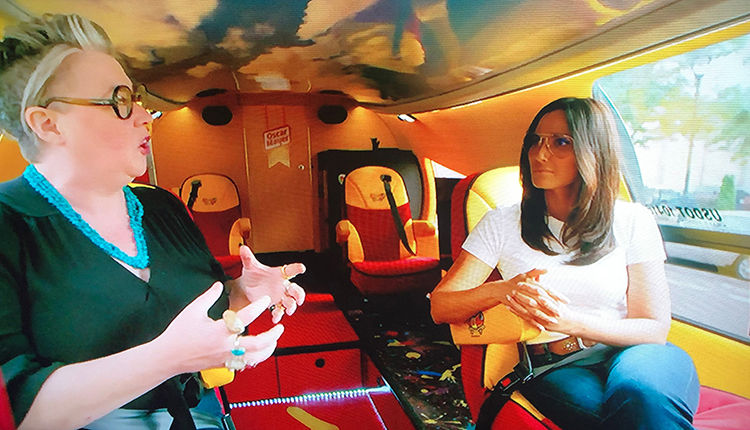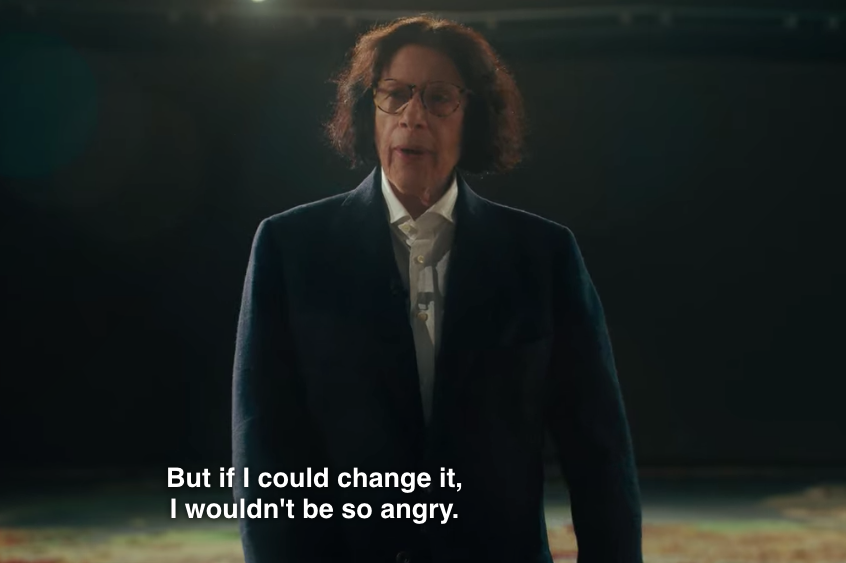TASTE THE NATION IS TOO CAUTIOUS FOR COMFORT
- Tahnee

- Jul 15, 2020
- 9 min read
Padma Lakshmi's Hulu series is a warm, but shallow portrait of immigrant influence on American foodways.

“The most hardcore racist person would probably really enjoy any of these dishes.” “Yeah - Who doesn’t like a taco, you know?” Padma Lakshmi says to Rico Torres, chef and co-owner of Mixtli in San Antonio, Texas in episode one of her new Hulu series, Taste the Nation. Lakshmi is visiting the border town of El Paso to explore the immigrant community that makes some of Texas’s most popular and iconic food. This is the premise of Taste the Nation; Lakshmi invites us to visit the immigrant communities responsible for some of America’s most staple foodways in the hopes of answering the questions, “What is American food?”
As a dedicated fan of Lakshmi, my mouth watered for this show when I learned of its impending drop on Hulu, and who better, I thought, to usher us into these communities than Lakshmi? An Indian immigrant woman with knowledge of both the immigrant experience and the intricacies of the ever-changing food world. As a writer of three cookbooks, a judge on renowned food competition show Top Chef for over a decade and no novice to food television (she’s hosted two food and travel shows before this), Lakshmi is more than qualified and the white, male world of food media is starved for her perspective.
In short, the time was ripe for Taste the Nation to premiere. The food media world (the world in general, really) has been rightly turned upside down in 2020. In May, cookbook author and former NYTimes Food columnist Alison Roman wielded her particular brand of bravado in an interview with the New Consumer disparaging Marie Kondo and Chrissy Teigen for “selling out.” Her comments didn’t just come off as needlessly catty, but racially insensitive as her only examples of “selling out” were two Asian women (I can think of a few examples of white food/lifestyle influencers who’ve maximized their brands….rhymes with Smachel Smay, Smenyth Smaltrow, Flobby Flay...to name a few). Soon after Roman’s incendiary remarks, Bon Appetit’s Editor in Chief since 2010, Adam Rapoport, resigned in early June after a photo of him dressed in brownface at a 2004 Halloween party resurfaced, which prompted many BA staffers of color to divulge racist, misogynistic and altogether oppressive work conditions. Of course, the food world has been contending with appropriation and disparity long before these “cancellations.” White males have dominated these spaces for a long time, until shows like Samin Nosrat’s Salt, Fat, Acid, Heat and David Chang’s Ugly Delicious graced our streaming services (more on that later) with fresh and specific perspectives. All of this context, again, makes Lakshmi’s show so compelling at the jump.
But unfortunately, more often than not, Taste the Nation falls short on its promise of a deep dive through Lakshmi’s distinct lens. When the inevitable comparisons were made between Anthony Bourdain’s Parts Unknown and Taste the Nation, Lakshmi made it clear that her perspective as an immigrant woman of color contributes in large part to what makes her series different from Bourdain’s.
“My point of view is infused with my life experience. And I am a woman, and that affects my point of view. I’m a mother. That affects my point of view. I’m a woman of color living in a white society her whole life. That affects my point of view. I have been subjected to beauty standards that my male colleagues don’t even know what it’s like to be subjected to. That informs my point of view,” she told the Washington Post. The agreement that Lakshmi will infuse the show with what makes her unique as a host is an exciting proposition, and yet, I was left feeling like I get a better sense of what her views are after watching an episode of Top Chef.
Lakshmi’s Taste the Nation is not the same show as Parts Unknown (or even its predecessors, No Reservations or A Cook’s Tour) and that’s deliberate. She has no interest in “swashbuckling,” a term she uses to describe what hosts like Anthony Bourdain, or Andrew Zimmern do on their respective shows. She’s not trying to utilize her show as a vehicle for her own perspective. In fact, because Lakshmi is an immigrant herself, and because she is well versed in the many, many food cultures that freckle the U.S., there’s a sense that she’s showing us what she already knows to be true. In other words, she’s proving a point, not discovering it, which is demonstrated with Lakshmi’s questions designed to elicit specific responses (“It sounds like you connected back with your culture through food." ”Is food the way that you mainly pass on our heritage to your kids?” “So then, is your food the ticket to your sovereignty?”) This isn’t about Lakshmi’s personal journey, unlike other food shows like Bourdain’s or David Chang’s or in some ways, Samin Nosrat’s. In an interview with Food & Wine Lakshmi explains, “It didn’t matter what I thought. I wanted to be quiet and let these communities lead me, lead the storytelling.” To be frank, she should be able to do both - highlight the leaders in the community and give comment and perspective as a host. If it doesn’t matter what you think, then why shouldn’t another white man have the job? Abdicating her responsibility as a host might be a well-intentioned pivot, but it drains the show of a specific point of view and a point of view we desperately need in the food world. It’s a shame because in brief moments when we actually learn through her point of view is when the shoe actually starts to feel like a real exploration rather than a lesson made palatable for the white Americans. A show about food and culture devoid of a guiding personality and divorced from Lakshmi’s philosophies, which are loudly vocalized everywhere else, is a missed opportunity. At worst, it forces the immigrant communities she’s visiting to do the emotional labor of educating and convincing viewers that they aren’t “others” and at best, it enforces a dangerous idea that a female host needs to be accommodating or neutral to be watchable.
Beyond the relinquishing of her own perspective, the series has an American mythology problem. Time and time again, the idea of sharing a meal, “breaking bread,” sitting at a table together, is touted as a way to repair our nation’s divides. According to Taste the Nation, food is a magical cure-all that connects us to others and erases conflict. But what is food if not highly political? Food is able to cross borders that people can’t. It’s grown, cooked, served and eaten by people, people who are violently affected by government, immigration, climate, labor conditions and the policies that control them. And yet, the series is enamored by the idea that flavor on its own will bridge the widening gaps between Republican and Democrat, racist and anti-racist, immigrant and native. What better example of cuisine’s limitations than the first episode in El Paso, wherein day workers from Juarez cross the border every day to make Mexican food at a local diner owned by a Trump supporter named Maynard. As Padma sits, literally hand in hand with Maynard, he waxes poetic about how Mexicans are good people who keep “getting harassed”. He loves these people, he says, and he certainly loves their food (for eating and for his profit, of course), but as food writer Alicia Kennedy said in her newsletter (an excellent resource for anti-capitalist, anti-racist food writing that delves more into this show’s culinary blindspots than I ever could) “you can claim to love a people and their food and still vote against their humanity.” Maynard has voted, and will continue to vote (he voted for Reagan, both Bushes, and Donald Trump, who is “an idiot, but I like him”) in opposition to the livelihood, survival, and dignity of the people he “loves”. This goes unquestioned by Lakshmi. Turns out chile rellenos, in fact, do not lead to changing attitudes.
In an attempt to contextualize Lakshmi’s intentions, I seeked out interviews she gave about the show’s genesis, and about the El Paso episode specifically. It only made things muddier. In an interview with Eater, Lakshmi positions herself as a neutral party to the diner owner’s opinions.
“I know for a fact that I wouldn’t have gotten to know him as well if I tried to talk to him rather than just listen to what he had to say. And that’s why I was there. I wasn’t there because I wanted my audience to know my opinion. I was there because I wanted my audience to be exposed to people like Maynard, to be exposed to people like Rosa in the Peruvian episode. Those are the people that make up this country. That’s what this country is like. And a lot of people, especially in media, live on either coasts, and they’re insulated in a way to their own detriment. So for me, I wanted to come away from the series changed, because I knew... Or just educated. Just more informed. I knew that if I didn’t let them speak, then the point of doing the show would have been lost,” she says.
The frustration I feel from a quote like this is multifold; the “exposure” Padma speaks of is a fallacy. We’re routinely exposed to people like Maynard. We have a fascist in the White House, and our neighbors refuse to say Black Lives Matter. Even Lakshmi herself says she has uncles like Maynard in her family. People like Maynard (notably a first generation American born from Syrian immigrants, who could potentially offer a fascinating look into why so many first generation Americans become conservative but I digress) live in our neighborhoods, work in our offices, and come to our family barbeques. We don’t need exposure, we need people with platforms to hold space for debate. How do we move forward without inquiry? If food alone could repair us, I’d wager our polarized society would’ve taken a different shape long ago.
I’m not suggesting that food is without power. In many instances throughout the series, food is the first and sometimes only avenue by which immigrants and their children are able to relate and connect to their heritage. In the episodes about Persian immigrants in Los Angeles, Indian immigrants in New York, and Chinese immigrants in San Francisco, cuisine is preservation of family values and cultural traditions. The dissonance expressed by so many first generation Americans in regards to feeling without a country is deeply compelling, but not enough time is given for them to explore that dissonance beyond cuisine’s connective properties. A compelling example of how one might address this dissonance is the fourth episode of David Chang’s Ugly Delicious entitled “Shrimp & Crawfish”, where he explores the distinct experience of Vietnamese chefs in New Orleans and Houston, the tension between tradition and innovation, and the specific food preparations that make these places different.
Not even really scratched at is the complicated idea of the “American dream” that immigrants are searching for when they arrive in the United States. What is the American dream? In between the frustratingly mundane archives and the history lessons lacking enough context or detail to pass a fourth grade history test, a romanticized America of exceptionalism and meritocracy is presented. We know this is a myth. Why does it appear that the food of “German immigrants” (who, more accurately, were German speaking people from a wide swath of Central Europe) was so seamlessly assimilated into what we now know as ubiquitous American food? Because they were white. Not because hot dogs and beer is inherently more patriotic (as Padma points out in the first episode, the U.S. eats more salsa than ketchup). Not because the food itself bootstrapped it’s way to the mainstream. White supremacy is the foundation of our country, and thus, white people food is a culinary baseline. Again, this is left unquestioned (the entire Milwaukee episode is bizarre, skip it).
There are shining moments in the series, most notably when Lakshmi speaks with women about their immigrant experience. It’s clear that this is where her interests lie and where she is most comfortable. But the earnestness that permeates the show gets a bit tiresome. It’s not the same earnestness that allowed us to witness Samin Nosrat crying over a piece of parmesan cheese, but an earnestness that keeps us at a distance, that encourages passivity, that produces lines like “I hope that breaking bread together can finally help us overcome some of these ridiculous misconceptions.” The show uses archives and voiceover as shorthand for “big ideas” (see; footage of drug dealers packing bags of cocaine, illustrations of slaves being brought from West Africa, the ambiguous phrase “according to records”) and the writing, like the aforementioned line, imbues a sentimentality that feels empty.
Ultimately, I hope Taste the Nation gets a second season, which I know sounds antithetical to everything I just said. But as I stated at the start, we need a perspective that isn’t white or male in this space and I hope Lakshmi gets a chance to do what she set out to do (not to mention, men who get it wrong the first time are likely to get second chances). The food and the culture Lakshmi is showing is tremendously exciting, which is what keeps you watching, but the question she asks at the beginning of each episode “What is American food?” is flawed, and feels like a platitude that disguises other, more compelling questions that go uninterrogated. Taste the Nation is not the reckoning it promises - it’s a hollow call for unity by way of tacos. Perhaps what the show is lacking is the most “American” act of all; dissent.



Comments